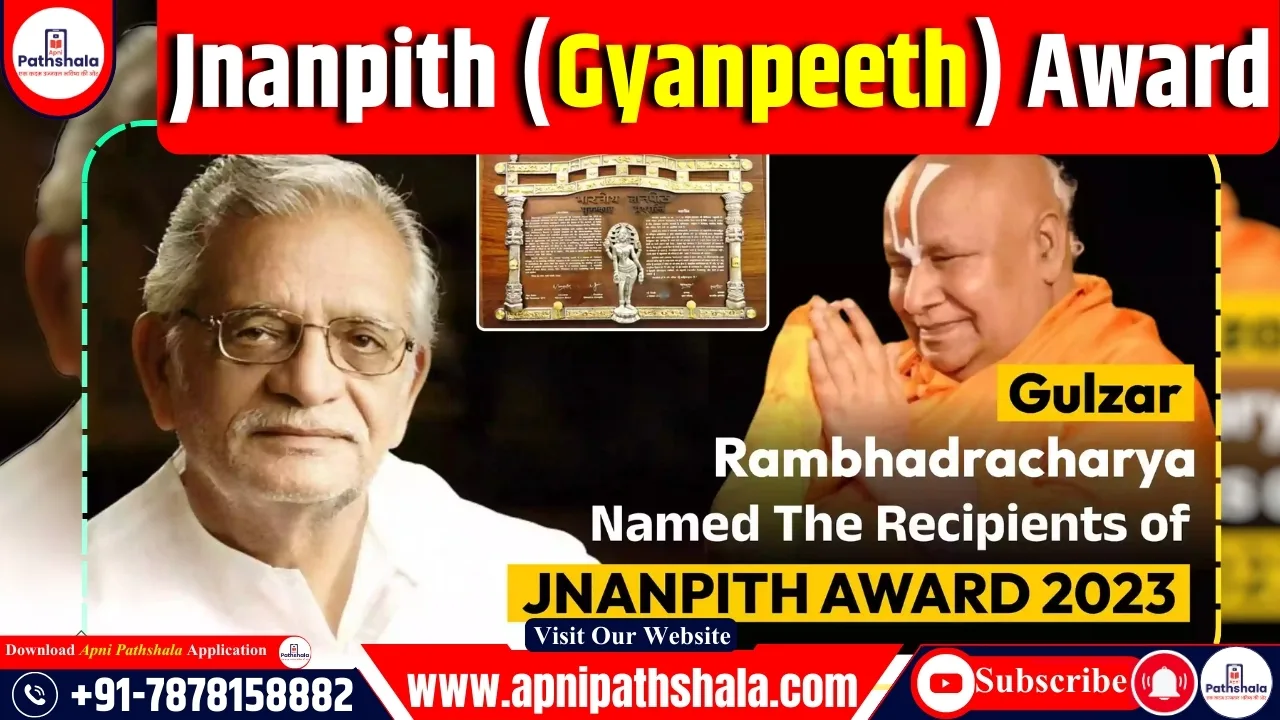What’s in this Article?
- Table of Contents
- Why in the News?
- About “Jnanpith Award”.
- Selection Process.
- Recipient
- Facts
- FAQs
- MCQs
Why in the News?
- The 58th Jnanpith Award (Seat of Knowledge) was granted to Gulzar and Jagadguru Rambhadracharya by the Jnanpith Selection Committee on February 17th.
- About Gulzar
- Gulzar, whose real name is Sampooran Singh Kalra, is a renowned figure in the realm of Hindi cinema and a highly esteemed Urdu poet.
- Regarded as one of the finest poets of his era.
- Among his notable honours are the Sahitya Akademi Award for Urdu in 2002, the Dadasaheb Phalke Award in 2013, the Padma Bhushan in 2004, and at least five National Film Awards.
- His contributions extend to iconic works such as the song “Jai Ho” from the film “Slumdog Millionaire,” which clinched both an Oscar in 2008 and a Grammy in 2010.
- About Rambhadracharya
- Rambhadracharya, aged 74, is a distinguished figure in Hindu spirituality, education, and literature.
- He founded and leads Tulsi Peeth in Chitrakoot, having authored over 240 books, including four epic works.
- Despite losing his sight at two months due to trachoma, Rambhadracharya is remarkably multilingual, and proficient in 22 languages.
- His contributions were honoured with the Padma Vibhushan Award in 2015.
- Born as Giridhara Misra, Rambhadracharya received his early education from his grandfather, mastering texts like the Bhagavad Gita and the Ramcharitamanas by the age of eight.
About “Jnanpith Award”
- The Jnanpith Award, initiated by Sahu Shanti Prasad Jain, founder of Bharatiya Jnanpith, a cultural and research institution established in 1944, aimed to honour the remarkable contributions of Indian writers.
- Its inaugural recipient in 1965 was G. Shankara Kurup, recognized for his Malayalam poetry collection, “Odakkuzhal.”
- Over the years, this prestigious accolade has been bestowed upon numerous esteemed figures in Indian literature such as Rabindranath Tagore, Premchand, R.K. Narayan, and Arundhati Roy.
- This award is felicitated only to the Indian authors (Indian nationals).
- It is given only for the literary works of any of the 22 languages included under the eighth schedule of the Indian Constitution.
- Note: The Eighth (VIII) Schedule of the Constitution consists of 22 languages which are:-
-
- Assamese
- Bengali
- Gujarati
- Hindi
- Kannada
- Kashmiri
- Konkani
- Malayalam
- Manipuri
- Marathi
- Nepali
- Oriya
- Punjabi
- Sanskrit
- Sindhi
- Tamil
- Telugu
- Urdu
- Bodo
- Santhali
- Maithili
- Dogri
- The Sindhi language was added by the 21st Amendment Act 1967. Konkani, Manipuri and Nepali were added by the 71st Amendment, enacted in 1992.
- Subsequently, Bodo, Dogri, Maithili and Santhali were added by the 92nd Amendment, 2003.
Selection Process
- The nominations for awards are gathered from a diverse array of literary experts, educators, critics, universities, and various literary and language organizations.
- To ensure fairness, a new advisory committee is established every three years for each language.
- An important regulation stipulates that the language in which the most recent recipient has written is ineligible for consideration for the subsequent two years.
- Each language’s advisory committee consists of three distinguished literary critics and scholars specializing in that language.
- They meticulously review all nominations and present their recommendations to the Jnanpith Award Selection Board.
- This Selection Board is comprised of esteemed individuals renowned for their high integrity and standing in the literary community.
- It typically includes seven to eleven members who serve a three-year term, with the option for extension up to two additional terms.
- In assessing the recommendations from the language advisory committees, the board examines complete or partial translations of the chosen works of the nominated authors into Hindi or English.
- Ultimately, the Selection Board retains the final authority in the selection process and announces the recipient for a given year.
List of Jnanpith Award Recipients – 1965 to 2023
|
S.No. |
Recipients Name |
Language |
Year |
|
1. |
G. Sankara Kurup |
Malayalam |
1965 |
|
2. |
Tarashankar Bandopadhyaya |
Bengali |
1966 |
|
3. |
Kuppali Venkatappagowda Puttappa |
Kannada |
1967 |
|
4. |
Umashankar Joshi |
Gujarati |
|
|
5. |
Sumitranandan Pant |
Hindi |
1968 |
|
6. |
Firaq Gorakhpuri |
Urdu |
1969 |
|
7. |
Viswanatha Satyanarayana |
Telugu |
1970 |
|
8. |
Bishnu Dey |
Bengali |
1971 |
|
9. |
Ramdhari Singh Dinkar |
Hindi |
1972 |
|
10. |
Dattatreya Ramachandra Bendre |
Kannada |
1973 |
|
11. |
Gopinath Mohanty |
Oriya |
|
|
12. |
Vishnu Sakharam Khandekar |
Marathi |
1974 |
|
13. |
P. V. Akilan |
Tamil |
1975 |
|
14. |
Ashapurna Devi |
Bengali |
1976 |
|
15. |
K. Shivaram Karanth |
Kannada |
1977 |
|
16. |
Sachchidananda Hirananda Vatsyayan ‘Ajneya’ |
Hindi |
1978 |
|
17. |
Birendra Kumar Bhattacharya |
Assamese |
1979 |
|
18. |
S. K. Pottekkatt |
Malayalam |
1980 |
|
19. |
Amrita Pritam |
Punjabi |
1981 |
|
20. |
Mahadevi Varma |
Hindi |
1982 |
|
21. |
Masti Venkatesh Iyengar |
Kannada |
1983 |
|
22. |
Thakazhi Sivasankara Pillai |
Malayalam |
1984 |
|
23. |
Pannalal Patel |
Gujarati |
1985 |
|
24. |
Sachidananda Routray |
Oriya |
1986 |
|
25. |
Vishnu Vaman Shirwadkar |
Marathi |
1987 |
|
26. |
Dr. C. Narayana Reddy |
Telugu |
1988 |
|
27. |
Qurratulain Hyder |
Urdu |
1989 |
|
28. |
Vinayaka Krishna Gokak |
Kannada |
1990 |
|
29. |
Subhas Mukhopadhyay |
Bengali |
1991 |
|
30. |
Naresh Mehta |
Hindi |
1992 |
|
31. |
Sitakant Mahapatra |
Oriya |
1993 |
|
32. |
U. R. Ananthamurthy |
Kannada |
1994 |
|
33. |
Dr. M. T. Vasudevan Nair |
Malayalam |
1995 |
|
34. |
Mahasweta Devi |
Bengali |
1996 |
|
35. |
Ali Sardar Jafri |
Urdu |
1997 |
|
36. |
Girish Karnad |
Kannada |
1998 |
|
37. |
Gurdial Singh |
Punjabi |
1999 |
|
38. |
Nirmal Verma |
Hindi |
|
|
39. |
Indira Goswami |
Assamese |
2000 |
|
40. |
Rajendra Keshavlal Shah |
Gujarati |
2001 |
|
41. |
D. Jayakanthan |
Tamil |
2002 |
|
42. |
Vinda Karandikar |
Marathi |
2003 |
|
43. |
Rehman Rahi |
Kashmiri |
2004 |
|
44. |
Kunwar Narayan |
Hindi |
2005 |
|
45. |
Ravindra Kelekar |
Konkani |
2006 |
|
46. |
Satya Vrat Shastri |
Sanskrit |
|
|
47. |
Dr. O. N. V. Kurup |
Malayalam |
2007 |
|
48. |
Akhlaq Mohammed Khan |
Urdu |
2008 |
|
49. |
Amar Kant |
Hindi |
2009 |
|
50. |
Shrilal Shukla |
||
|
51. |
Chandrashekhara Kambara |
Kannada |
2010 |
|
52. |
Pratibha Ray |
Urdu |
2011 |
|
53. |
Ravauri Bharadwaja |
Telugu |
2012 |
|
54. |
Kedarnath Singh |
Hindi |
2013 |
|
55. |
Bhalchandra Nemade |
Marathi |
2014 |
|
56. |
Dr. Raghuvir Chaudhari |
Gujarati |
2015 |
|
57. |
Shanka Ghosh |
Bengali |
2016 |
|
58. |
Krishna Sobti |
Hindi |
2017 |
|
59. |
Amitav Ghosh |
English |
2018 |
|
60. |
Akkitham Achuthan Namboothiri |
Malayalam |
2019 |
|
61. |
Nilamani Phookan |
Assamese |
2021 |
|
62. |
Damodar Mauzo |
Konkani |
2022 |
|
63. |
Gulzar (Sampooran Singh Kalra) |
Urdu |
2023 |
|
64. |
Jagadguru Rambhadracharya |
Sanskrit |
Facts about Jnanpith Award
- Jnanpith Award has achieved the recognition of the highest literary award in the country.
- The Award is open only to Indian citizens and is given annually.
- This award is not conferred posthumously.
- English along with other Indian languages is considered for the Award.
- Remember that the Jnanpith Award is offered in 23 languages (22 + English).
- The winner is given a cash prize of Rs. 11 lakh and a bronze replica of Goddess Saraswati (Vagdevi), the Hindu goddess of learning.
- The first recipient of the award was Malayalam writer G Sankara Kurup in 1965 for his novel ‘Odakkuzhal’ (The Bamboo Flute).
- The first woman writer to be awarded this award was Ashapoorna Devi, a Bengali writer, in 1976.
- The organization which presents this award was founded in 1944 by industrialist and philanthropist Sahu Shanti Prasad Jain.
- Jnanpith Award is sponsored by the cultural organization Bharatiya Jnanpith.
- In 2019, author Amitav Ghosh was felicitated with the 54th Jnanpith Award. He became the first English language writer to become a Jnanpith laureate.
Disclaimer: The article may contain information pertaining to prior academic years; for further information, visit the “official or concerned website“.
Frequently Asked Questions (FAQ’s)
- Question: Who was the first recipient of the Jnanpith award?
- Ans:
- The first recipient of the Jnanpith Award, which is one of the most prestigious literary awards in India, was G. Sankara Kurup.
- He received the award in 1965 for his contributions to Malayalam literature (poems called Odakkuzhal).
- Kurup was a renowned poet and writer from the state of Kerala.
- Question: Who received the 1st English Jnanpith award?
- Ans :
- The first English Jnanpith Award was given to “Amitav Ghosh” in 2018 for his outstanding contribution to English literature.
- Ghosh is a renowned Indian author known for his novels such as “The Shadow Lines,” “The Glass Palace,” and “Sea of Poppies.”
- Question: Who was the first woman to receive the Jnanpith Award?
- Ans:
- The first woman to receive the Jnanpith Award was Ashapoorna Devi, an eminent Bengali writer.
- She received the award in 1976 for her significant contributions to Indian literature.
- Devi is renowned for her novels, short stories, and essays that often depict the lives of women in Bengali society.
MCQ’s
- Q. Which of the following is considered the highest literary award in India?
-
- Jnanpith Award
- Saraswati Samman
- Sahitya Academy Award
- Vyas Samman
Ans: (a) Jnanpith Award
-
- Q. When was Jnanpith Award instituted?
-
- 1951
- 1954
- 1961
- 1985
Ans: (c) 1961
-
- Q. What is the amount of Jnanpith Award?
-
-
- 15 lakh rupees
- 12 lakh rupees
- 10 lakh rupees
- 11 lakh rupees
Ans: (d) 11 lakh rupees
-
- Q. Who was the first Hindi writer to receive Jnanpith Award ?
-
- Mahadevi Verma
- Sumitranandan Pant
- Ramdhari Singh Dinkar
- H. Vatsyayan
Ans: (b) Sumitranandan Pant
-
Disclaimer: The article may contain information pertaining to prior academic years; for further information, visit the exam’s “official or concerned website“.

























